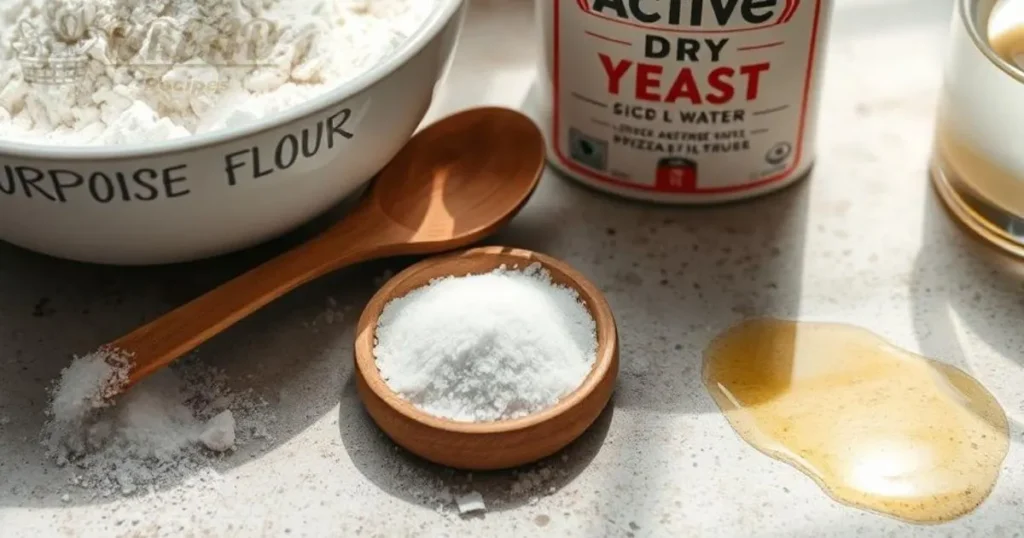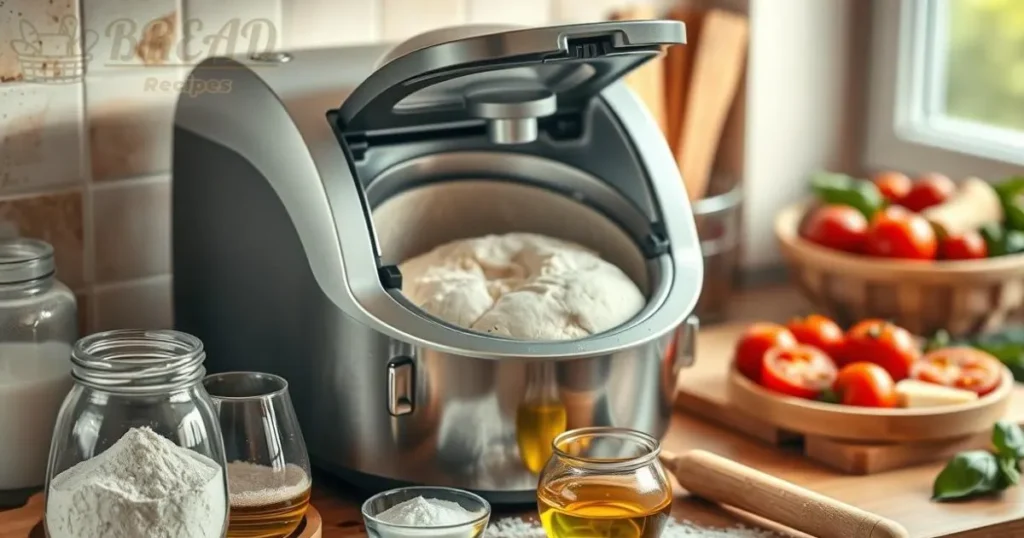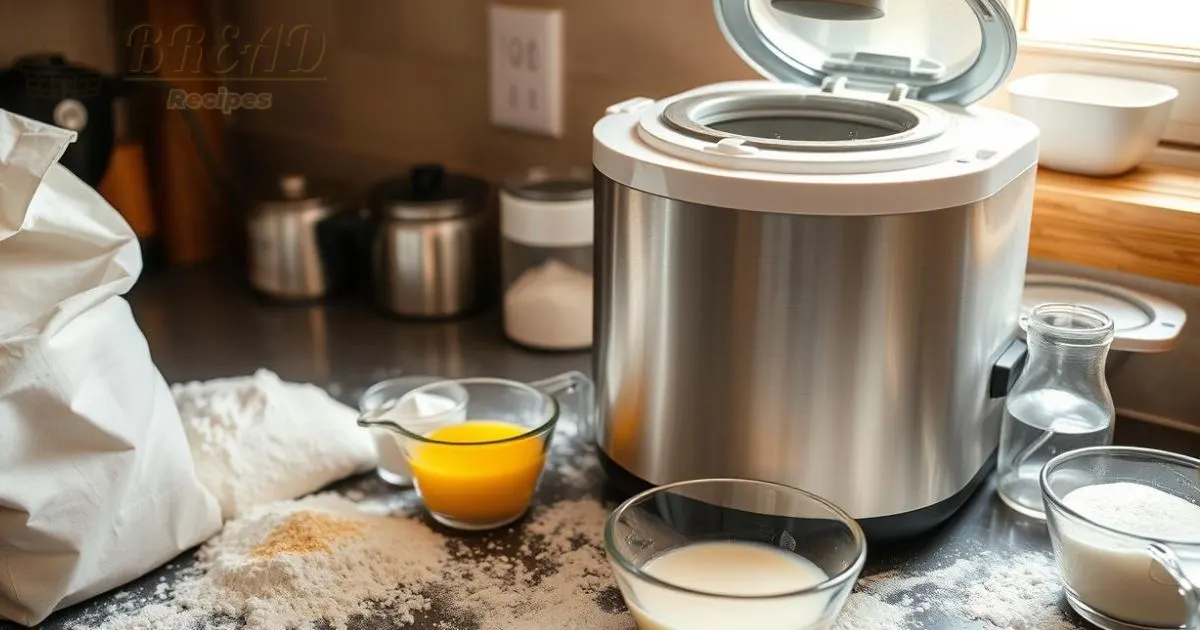Imagine making restaurant-quality pizza dough at home without spending hours. You can turn simple bread machine dough into a masterpiece. This saves time and brings amazing flavors to your table.
Making homemade pizza dough is surprisingly easy. The bread machine method skips the hard kneading. With just a few ingredients, you can have fresh dough for your next pizza night.
Refrigerating the dough lets you prepare ahead. It develops deeper flavors. By using the right techniques, you can make dough as good as your favorite pizzeria.
Table of Contents
Key Takeaways
- Bread machines simplify pizza dough preparation
- Homemade dough can be refrigerated up to 3 days
- One batch typically yields one large or two medium pizzas
- Cold fermentation enhances dough flavor and texture
- Minimal ingredients create exceptional pizza dough
Understanding Pizza Dough Basics
Making the perfect pizza starts with knowing the basics of pizza dough. Whether you’re cooking at home or dreaming of being a pizzaiolo, learning about the key ingredients is key. It will make your pizza-making better.

Essential Pizza Dough Ingredients
To make great pizza dough, you need a few important things. Here’s what you’ll need:
- Bread flour for pizza (high-protein content)
- Warm water (110-120°F)
- Extra virgin olive oil
- Active dry yeast
- Salt
- Sugar
Understanding Ingredient Roles
Each ingredient in pizza dough is vital for flavor and texture:
- Bread Flour: Gives structure and chewiness
- Yeast: Makes it rise and adds flavor
- Salt: Boosts taste and controls yeast
- Olive Oil: Adds richness and helps with browning
Selecting the Right Flour
Bread flour is the best choice for pizza dough. It has more protein (12-14%) for that chewy texture everyone loves. Unbleached bread flour is better for gluten development, making the crust stronger and tastier.
Pro tip: Always use fresh, high-quality ingredients for the best pizza dough results!
When picking flour, choose unbleached bread flour with 12-14% protein. This will give your pizza dough the perfect texture and taste.
The Benefits of Using a Bread Machine
Using a bread machine for pizza dough makes pizza night a breeze. It makes making dough easy and quick. This is great for anyone who loves to cook.

Bread machines do more than just save time. They change the game for pizza lovers. Here’s why:
Consistent Results Every Time
Bread machines make dough perfectly every time. They mix and knead with precision. This means:
- Perfect dough texture every single time
- Consistent gluten development
- Optimal rising conditions
“A bread machine takes the guesswork out of pizza dough preparation.” – Home Cooking Experts
Time-Saving Convenience
Your bread machine is like a personal dough helper. It takes about 1 hour and 50 minutes to make dough. You can use this time to prepare other parts of your meal.
| Preparation Method | Hands-On Time |
|---|---|
| Hand Kneading | 30-45 minutes |
| Bread Machine Dough Cycle | 20 minutes |
Pro tip: Most bread machines offer multiple dough cycles, making them incredibly versatile for various recipes beyond pizza.
Getting a bread machine saves you time and ensures your dough is always perfect. It’s perfect for busy people or anyone who loves to cook. It makes making homemade pizza dough easy and fun.
Step-by-Step Guide to Making Pizza Dough
Making the perfect pizza dough in a bread machine is simpler than you think. With the right steps, you can make a homemade crust that’s as good as a pizzeria’s. Learning how to make pizza dough in a bread machine makes the process easy and ensures great results.
Piuzza Dough From Bread Machine To Refrigerator
Setting Up Your Bread Machine
First, get all your ingredients ready and make sure your bread machine is clean. Precision is crucial when making pizza dough. Here are the key steps:
- Check that all machine components are secure
- Measure ingredients accurately
- Use room temperature ingredients for best results
Adding Ingredients in the Correct Order
The order in which you add ingredients is very important. Professional bakers suggest this order:
- Liquid ingredients first: Water and olive oil
- Dry ingredients: Flour, salt, sugar
- Yeast: Sprinkled on top of dry ingredients
| Ingredient | Quantity | Purpose |
|---|---|---|
| Cool Water | 1 cup + 1 tablespoon | Activates yeast |
| Olive Oil | 2 tablespoons | Adds flavor and texture |
| Bread Flour | 3 cups | Creates structure |
| Instant Yeast | 2 teaspoons | Helps dough rise |
Selecting the Right Cycle
Most bread machines have a dough cycle just for pizza. This cycle lasts about 1 hour and 50 minutes. After it’s done, your dough is ready to be shaped and turned into a tasty pizza crust.
“The secret to great pizza is in the dough.” – Wolfgang Puck
Remember, the more you practice, the better you’ll get at making bread machine pizza dough. Each try will help you learn more about your machine and ingredients.
How to Properly Store Pizza Dough
Making the perfect pizza dough is just the start. Storing it right keeps it fresh and tasty. The right storage can greatly improve your pizza’s quality and flavor.
Cooling the Dough After Mixing
Let the dough cool a bit after taking it out of the bread machine. This step is key for better texture and easier handling. Rest the dough for 15-20 minutes to relax the gluten and make rolling easier.
Choosing the Right Pizza Dough Storage Containers
Picking the right containers is crucial for keeping your dough fresh. Here are some top picks for storing pizza dough:
- Airtight plastic containers with secure lids
- Glass containers with tight-fitting seals
- Gallon-sized freezer bags
- Heavy-duty plastic wrap with an additional foil layer
For storing pizza dough, use a multi-layer protection method. First, wrap the dough balls in plastic wrap. Then, cover them in foil. Finally, add another layer of plastic wrap. This method prevents freezer burn and keeps the dough fresh.
| Storage Method | Duration | Best For |
|---|---|---|
| Refrigerator | Up to 3 days | Short-term storage |
| Freezer | Up to 3 months | Long-term storage |
“The secret to great pizza begins with proper dough storage.” – Professional Pizza Chef
Pro tip: When freezing, divide your dough into individual portions. Most gallon freezer bags can hold two large pizza dough balls. Be sure to label the bags with the date to keep track of freshness.
Defrosting Your Stored Pizza Dough
To defrost frozen pizza dough, move it from the freezer to the fridge the night before. This slow thawing keeps the dough’s texture and prevents damage to its structure.
Refrigerating Pizza Dough: Tips and Tricks
Learning how to refrigerate pizza dough can change your pizza game. It helps develop deeper flavors and a better texture.
Understanding Refrigeration Timeframes
It’s key to know how long to chill your pizza dough. You can safely keep it in the fridge for 3-5 days. This cold time lets flavors grow slowly.
- Short-term refrigeration: 24-48 hours
- Optimal flavor development: 48-72 hours
- Maximum refrigeration time: 5 days
Detecting Overproofed Dough
Knowing when your dough is too far gone is important. Look out for these signs:
- Excessive bubbling on the dough surface
- An overly sour or fermented smell
- Loss of elasticity and difficulty in shaping
- Dull, grayish appearance
“Refrigeration is an art form that can elevate your pizza dough from good to extraordinary.” – Professional Baker
When chilling pizza dough, use a tight container or plastic wrap. Before baking, let it warm up for 30 minutes. This makes it easier to shape.
Pro Tips for Perfect Refrigerated Dough
For the best refrigerated dough, follow these tips:
- Lightly oil the container to prevent sticking
- Allow some room for dough expansion
- Check dough periodically during refrigeration
With these tips, you can make pizzas as good as a restaurant’s in your kitchen.
How to Shape and Prepare Dough Post-Refrigeration
After storing your pizza dough in the fridge, it’s time to make pizza. Shaping the dough needs patience and skill for a perfect crust.
Temperature is key when preparing dough. Take it out of the fridge and let it rest at room temperature for 30-45 minutes. This helps the gluten relax, making shaping easier.
Bringing Dough to Room Temperature
Here’s how to get your dough ready:
- Remove dough from refrigerator
- Place in a lightly oiled bowl
- Cover with a clean kitchen towel
- Allow to sit at room temperature
- Wait 30-45 minutes before shaping
Techniques for Shaping Pizza
Shaping pizza dough takes practice. Start by stretching it gently from the center outwards. For a pro look, try these methods:
- Gently press the dough with fingertips
- Lift and rotate the dough
- Use gravity to stretch the dough
- Aim for a thickness of about 1/4 inch
“The secret to great pizza is in the dough’s preparation and shaping.” – Professional Pizza Chef
Pro tip: Roll the dough on parchment paper for easy oven transfer. Make the edges thicker for a crispy crust that will wow everyone.
Utilizing Leftover Dough
Don’t let leftover pizza dough waste away! It can be turned into tasty dishes beyond just pizza. With some creativity, you can make exciting meals and snacks from it.
Creative Leftover Pizza Dough Recipes
Here are some tasty ways to use leftover pizza dough:
- Homemade breadsticks with garlic and herbs
- Savory calzones stuffed with cheese and vegetables
- Sweet cinnamon rolls for breakfast
- Cheesy garlic knots as a side dish
- Mini pizza pinwheels for appetizers
Mastering Freezing Pizza Dough
Freezing unused dough is a great way to save it for later. It can stay good for up to 3 months in the freezer.
“Freezing pizza dough is like having a culinary insurance policy – delicious pizza is always just a thaw away!”
Here’s how to freeze pizza dough:
- Wrap individual dough balls in plastic wrap
- Cover with aluminum foil for extra protection
- Place wrapped dough in a freezer-safe bag
- Label with the date of freezing
When you’re ready to use it, thaw the dough in the fridge overnight. Remember, thawed dough might need more time to rise, so plan ahead.
By learning to use leftover pizza dough and freezing it, you’ll always have a tasty meal or snack ready!
Common Mistakes to Avoid
Making perfect pizza dough needs skill and care. Many home bakers make mistakes that affect the pizza’s taste and texture. Knowing these mistakes helps you make a delicious pizza every time.
The Danger of Overworked Pizza Dough
Overworking pizza dough can make it tough and chewy. This happens when you knead or mix it too much. Professional bakers say to handle the dough gently to keep it soft.
- Limit kneading to 8-10 minutes
- Avoid aggressive mixing techniques
- Let the dough rest between manipulations
Temperature: The Silent Game Changer
Temperature is key in making pizza dough. Yeast needs the right warmth to work well. Water at 100-110°F is perfect for yeast to grow, making the dough rise.
“The secret to great pizza dough is understanding the delicate balance of ingredients and temperature.” – Professional Pizza Chef
When cooling dough, watch the temperature. If it’s too cold, it can get soggy. Let it cool slowly to keep it fresh.
Additional Pizza Dough Pitfalls to Watch
- Undermixing can leave dry flour clumps
- Exposing dough to air causes surface drying
- Incorrect hydration levels make stretching difficult
By avoiding these common mistakes, you can make pizzas like a pro. Remember, practice, patience, and detail are essential for perfect pizza dough.
Enhancing Flavor in Your Pizza Dough
Making a memorable pizza begins with turning basic dough into a flavorful base. Your flavored pizza dough can turn a simple meal into a feast for the senses.
Making an herb pizza crust is more than just adding ingredients. It’s about knowing how herbs and spices work with your dough. Finding the right balance and experimenting is key.
Exploring Herb and Spice Combinations
Your pizza dough is a canvas for flavors when you add the right herbs and spices. Try these exciting options:
- Dried basil for an Italian classic touch
- Garlic powder for deep, savory notes
- Rosemary for an aromatic Mediterranean twist
- Thyme for a subtle earthy undertone
Flour Variations for Unique Flavor Profiles
Trying different flours can change your herb pizza crust a lot. Each flour adds its own special flavor to the dough.
| Flour Type | Flavor Profile | Best Used With |
|---|---|---|
| Whole Wheat | Nutty, robust | Robust herb blends |
| Semolina | Slightly sweet, grainy | Mediterranean herbs |
| 00 Italian Flour | Delicate, smooth | Subtle herb infusions |
“The secret to an extraordinary pizza lies not just in its toppings, but in the depth of flavor within the crust itself.” – Professional Pizza Chef
Pro tip: When adding herbs to your dough, remember that less is more. Start with small amounts and adjust to taste. You want to add flavor, not overwhelm it.
Baking Your Pizza: Techniques for Best Results
Making the perfect homemade pizza is more than just great dough. The baking process is key to making your pizza amazing. Knowing the right techniques can make your pizza-baking experience better.
The Importance of a Hot Oven
Temperature is key when baking pizza. Chefs say to preheat your oven to 450-500°F (230-260°C). A very hot oven gives you:
- Crispy, golden-brown crust
- Perfectly melted cheese
- Evenly cooked toppings
Pizza Stone vs. Baking Sheet: Which is Better?
Choosing between a pizza stone and a baking sheet depends on what you prefer. Here’s what each offers:
| Pizza Stone | Baking Sheet |
|---|---|
| Retains heat extremely well | More affordable and accessible |
| Creates crispy bottom crust | Easier to clean and store |
| Mimics professional pizza oven | Suitable for home kitchens |
For the best results, preheat your chosen surface in the oven. Pro tip: If using a pizza stone, let it heat for at least 30 minutes before adding your pizza.
“The secret to great pizza is not just in the ingredients, but in the baking technique.” – Pizza Enthusiast
Bake your pizza for 12-15 minutes. Look for a golden-brown crust and bubbly cheese. For a crisper bottom, bake the crust a bit before adding toppings.
Troubleshooting Your Pizza Dough
Pizza dough can be tricky for home bakers. Knowing common problems helps make the perfect base. Fixing issues like dry or sticky dough is key to success.
Moisture is vital in making pizza dough. If it’s too dry, add water slowly until it’s smooth and slightly tacky. For sticky dough, add flour a little at a time. Check yeast by mixing it with warm water and sugar; active yeast will foam in 10-15 minutes.
Insufficient rise can be due to wrong yeast activation or temperature. Use warm water, about 110°F. Keep the dough in a warm, draft-free spot to rise. If it still doesn’t rise, try high-protein flour. Remember, practice is essential for mastering pizza dough.
Addressing Dry or Sticky Dough
Always check the dough’s texture while making it. Use a digital scale for accurate measurements. Check the dough’s consistency 15-18 minutes into mixing and adjust as needed.
Remedies for Insufficient Rise
Patience is crucial in making pizza dough. Let the dough rest at room temperature for 10-15 minutes before stretching. This relaxes the gluten. If it still doesn’t rise, check your yeast and make sure your environment is right for fermentation.
FAQ
Can I make pizza dough in a bread machine?
How long can I refrigerate pizza dough?
Can I freeze pizza dough?
What ingredients do I need to make pizza dough?
How do I know if my pizza dough is overproofed?
Can I add herbs to my pizza dough?
What should I do if my dough is too dry or sticky?
What’s the best way to bake a pizza with homemade dough?
Source Links
- Homemade Pizza Dough Recipe For Bread Machine – https://www.melaniecooks.com/homemade-pizza-dough-recipe-for-bread-machine/134/
- Simple 72 Hour Pizza Dough – https://bakingsteel.com/blogs/recipes/72-hour-pizza-dough?srsltid=AfmBOoq5dQZbjIBsGuZblyLNQniHixvoh6Yp751s1U2c1sBlYqdf3I4R
- Bread Machine Pizza Dough Recipe – Tasty Oven – https://tastyoven.com/bread-machine-pizza-dough/
- You know one way to use a bread machine. Here are even more. – https://www.kingarthurbaking.com/blog/2023/10/23/bread-machine-baking

